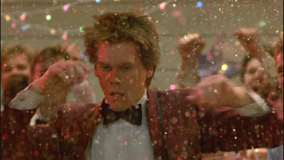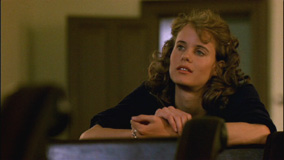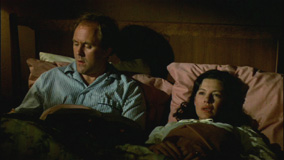Footloose (Herbert Ross) 1984
 The first forty-five minutes or so of Footloose are a buildup of teenage stress that’s supposed to pay
off with a cathartic dance sequence in which young Ren (Kevin Bacon), a plucky
teen from Chicago who’s been exiled in an anonymous Midwestern town without
pity, or much entertainment, blows off the oppressive steam that’s been
accumulating with a bit of soft-shoeing. At this point, the audience has
witnessed all sorts of small-town close-mindedness, including the banning of all
“harmful” rock music and the prejudices of a series of adults that just
don’t understand what it’s like to be a teenager, so they’re about due for
a release of some sort. Unfortunately, director Herbert Ross can’t make this
moment, where the music counts the most, sing. The subjective glances into
Ren’s head that begin the sequence and his over the top acrobatics suggest
something vaguely surreal, but the movie remains disappointingly grounded in
reality. Instead of transporting us elsewhere like it wants to, the combined
effect of the music, which is relatively disposable ‘80s pop, and the montage,
which removes any sense of athleticism from the dancing through rapid-fire
editing, is to underscore how short the film’s lifelike approach comes up when
compared to the fanciful musicals of the past.
The first forty-five minutes or so of Footloose are a buildup of teenage stress that’s supposed to pay
off with a cathartic dance sequence in which young Ren (Kevin Bacon), a plucky
teen from Chicago who’s been exiled in an anonymous Midwestern town without
pity, or much entertainment, blows off the oppressive steam that’s been
accumulating with a bit of soft-shoeing. At this point, the audience has
witnessed all sorts of small-town close-mindedness, including the banning of all
“harmful” rock music and the prejudices of a series of adults that just
don’t understand what it’s like to be a teenager, so they’re about due for
a release of some sort. Unfortunately, director Herbert Ross can’t make this
moment, where the music counts the most, sing. The subjective glances into
Ren’s head that begin the sequence and his over the top acrobatics suggest
something vaguely surreal, but the movie remains disappointingly grounded in
reality. Instead of transporting us elsewhere like it wants to, the combined
effect of the music, which is relatively disposable ‘80s pop, and the montage,
which removes any sense of athleticism from the dancing through rapid-fire
editing, is to underscore how short the film’s lifelike approach comes up when
compared to the fanciful musicals of the past.
 Perhaps reality seems wholly unsatisfying here because Footloose
is so resolutely unrealistic throughout that striving for a sense of realism
should be the least of its concerns. The movie takes place in a town that seems
removed from the rest of reality (which is how the residents like it,
apparently), but that doesn’t explain the moments of weirdness and isolation
that seem to permeate throughout the local mindset. At one point, when Ren is
initiated by a local girl with a trip to a secret hideout where the teens store
whatever fragments of forbidden pop culture they happen to stumble upon, the
moment feels like something out of Fahrenheit
451. Perhaps the most egregious distortions of veracity lie with the way the
movie schemes to curry audience favor. This is a teen movie that preaches a
message of acceptance in an attempt to win over both the cool kids and the evil
adults. In the early scenes, the oppressors, headed by an overzealous Protestant
reverend (John Lithgow) with a cross to bear, come off as insanely closed-minded
and dogmatic. Their repressed and repressive rage knows no bounds, and when
young Ren pipes up to defend “Slaughterhouse Five” from those who wish to
ban it, the gauntlet is thrown down. It’s to the movie’s credit, I suppose,
that it allows the characters to undergo some sort of growth as the move toward
an understanding of one another (even if Dianne Weist is the only one who’s
remotely convincing), but its approach is an intensely manipulative and
dishonest one.
Perhaps reality seems wholly unsatisfying here because Footloose
is so resolutely unrealistic throughout that striving for a sense of realism
should be the least of its concerns. The movie takes place in a town that seems
removed from the rest of reality (which is how the residents like it,
apparently), but that doesn’t explain the moments of weirdness and isolation
that seem to permeate throughout the local mindset. At one point, when Ren is
initiated by a local girl with a trip to a secret hideout where the teens store
whatever fragments of forbidden pop culture they happen to stumble upon, the
moment feels like something out of Fahrenheit
451. Perhaps the most egregious distortions of veracity lie with the way the
movie schemes to curry audience favor. This is a teen movie that preaches a
message of acceptance in an attempt to win over both the cool kids and the evil
adults. In the early scenes, the oppressors, headed by an overzealous Protestant
reverend (John Lithgow) with a cross to bear, come off as insanely closed-minded
and dogmatic. Their repressed and repressive rage knows no bounds, and when
young Ren pipes up to defend “Slaughterhouse Five” from those who wish to
ban it, the gauntlet is thrown down. It’s to the movie’s credit, I suppose,
that it allows the characters to undergo some sort of growth as the move toward
an understanding of one another (even if Dianne Weist is the only one who’s
remotely convincing), but its approach is an intensely manipulative and
dishonest one.
 Many of the early scenes in Footloose show kids standing around cussing, smoking, and generally
acting as every parent prays their child won’t, but as most teens do. It seems
refreshing at first to see teenagers acting like actual teenagers in a movie,
but they seem to do it only as a ploy. As soon as tensions begin easing between
the adolescents and the adults, they start acting wholesome and false, even when
no parents are around. By the final act of the movie, any feeling of rebellion
has been drained from the movie, and again, there’s not really any catharsis.
Ross expects his audience to roll over and accept the ending that’s offered
only because he’s reprising the title song. Footloose
doesn’t seem concerned with its plot at this point, and it hopes mindless
infectiousness is enough to power it until its end. Because Ross skews things
closer to reality that one might like, however, it fails to infect. The goofy
breakdancing session at the senior prom that closes Footloose
is a poor substitute for either the wildly pleasurable spectacles of past
Hollywood musicals or the exaggerated pathos of a great teen film like Rebel
Without a Cause.
Many of the early scenes in Footloose show kids standing around cussing, smoking, and generally
acting as every parent prays their child won’t, but as most teens do. It seems
refreshing at first to see teenagers acting like actual teenagers in a movie,
but they seem to do it only as a ploy. As soon as tensions begin easing between
the adolescents and the adults, they start acting wholesome and false, even when
no parents are around. By the final act of the movie, any feeling of rebellion
has been drained from the movie, and again, there’s not really any catharsis.
Ross expects his audience to roll over and accept the ending that’s offered
only because he’s reprising the title song. Footloose
doesn’t seem concerned with its plot at this point, and it hopes mindless
infectiousness is enough to power it until its end. Because Ross skews things
closer to reality that one might like, however, it fails to infect. The goofy
breakdancing session at the senior prom that closes Footloose
is a poor substitute for either the wildly pleasurable spectacles of past
Hollywood musicals or the exaggerated pathos of a great teen film like Rebel
Without a Cause.
* *
11-05-02
Jeremy Heilman